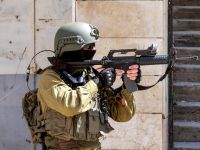U.S. President Bush said he and Crown Prince Abdullah of Saudi Arabia forged a personal bond Thursday in five hours of talks at the president's Texas ranch and Abdullah promised not to "use oil as a weapon" to show Arab anger over U.S. support for Israel.
The president's upbeat assessment contrasted with Saudi complaints that his backing of Israel had damaged prospects for Mideast peace and threatened the United States' 70-year alliance with the desert kingdom.
"There is a lot of anger at the U.S. for what is perceived as a lack of restraining (Ariel) Sharon," the Israeli prime minister, said Adel Al-Jubeir, the foreign policy adviser to Abdullah.
"The crown prince wanted to make sure the president was aware of this," the adviser said. "Allowing this problem to spiral out of control will have grave consequences for the U.S. and its interests."
Bush told reporters afterward that U.S.-Saudi relations were strong. "A strategy by some would be to split the United States and Saudi Arabia. It's a strong important friendship and he knows that, I know that, and we're not going to let that happen," he said.
"One of the really positive things out of this meeting is the fact the crown prince and I established a strong personal bond," Bush said. "We've spent a lot of time alone discussing our respective visions, talking about our families."
The Israeli-Palestinian crisis dominated Bush's first face-to-face meeting with Abdullah.
"There is a shared vision," the president said, adding that they discussed possible next steps in implementing a Saudi peace plan championed by Abdullah and endorsed by the 22-member Arab League.
The Saudi crown prince left without public comment. However, Prince Abdullah urged Washington to adopt an even-handed policy while handling the Arab-Israeli conflict.
“Being a sponsor of the Middle East peace process the US should address the issue in a just and fair manner taking into consideration the rights of the Arabs,” the Saudi Press Agency quoted the crown prince as saying.
According to the Saudi Arab News daily, the Crown Prince presented a new vision for Middle East peace based on the Saudi peace initiative, the latest four Security Council resolutions and the views of President Bush expressed in his address to UN General Assembly last November.
However, the Crown Prince stressed that the peace initiative depended on the Israeli withdrawal and the lifting of the siege on Arafat and a halt to Israeli settlements. Prince Abdullah, who also had a closed-door meeting with Bush, stressed that Arafat should not be harmed.
According to the Saudi daily, the Kingdom will support UN Secretary-General Kofi Annan’s proposal to deploy a multinational peacekeeping force in the occupied Arab territories. The Saudi side urged the US to provide financial assistance to the Palestinians to rebuild their infrastructure destroyed by the Israeli forces.
The Saudi leader, the SPA said, underlined the significant US role in bringing about peace and stability in the whole world, especially in the Middle East.
“The United States must support the Arab peace initiative which goes along with international resolutions,” the Saudi de-facto ruler told Bush, adding that the US support would give the initiative a strong push thanks to the country’s political strength.
Bush said his demand that Israel withdraw from Palestinian areas still stands: "I made it clear to him that I expected Israel to withdraw, just like I've made it clear to Israel. And we expect them to be finished." He also said Israel must resolve standoffs in Ramallah and Bethlehem "in a nonviolent way."
Bush was quoted as saying by AP he was grateful for Abdullah's assurance that Saudi Arabia would not support any other angry Arab states joining Iraq's oil embargo. The Saudi leader "made it clear ... that they will not use oil as a weapon and I appreciate that, respect that and expect that to be the case," Bush said.
The crown prince, whom Bush addressed all day as "Your Royal Highness," bore a warning that Bush's apparent tolerance of Israeli military offensives against Palestinians had damaged prospects for Mideast peace.
"We believe the administration could have been stronger on Sharon, made it clearer to him that negotiations cannot be done under the barrel of a gun," Nail Al-Jubeir, a spokesman for the Saudi Embassy, told reporters.
The crown prince brought a message, his spokesman said: "Sharon has been acting up, and the U.S. government needs to rein him in. We cannot maintain the peace process with this stuff going on."
A senior administration official briefing reporters after Thursday's talks said Bush raised general concerns about inciting anti-Israel terror.
The leaders reached no decision on a Mideast peace conference. On expanding the anti-terror war into Iraq, which Arab nations are resisting, Bush spoke of Saddam Hussein as a serious menace, the official said, and they discussed ideas of what to do about him.
With Abdullah remaining in the United States a couple more days, White House officials said they would continue to tend to the relationship. On Friday, Abdullah was taking a train with Bush's father, the first President Bush, from Houston to College Station, Texas, for lunch. (Albawaba.com)
© 2002 Al Bawaba (www.albawaba.com)









